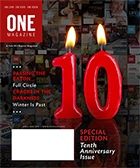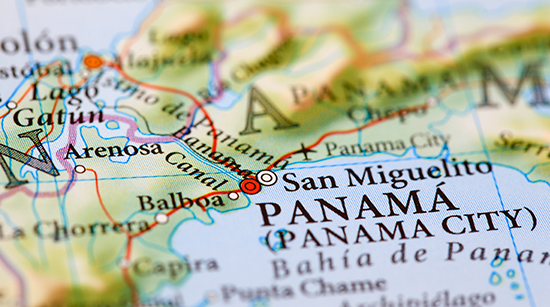
April-May 2015
10 Years in Print: Special Edition
------------------
|

Free Will Baptist missionaries leave the work in Panama in capable hands...
Passing the Baton
By Judy Lytle
Have you
ever participated in team-building activities? One common exercise calls for a person to fall backward, trusting two other team members to catch him. Another activity requires the team to use verbal directions to guide a blindfolded team member from point A to point B. These simple activities help create trust.
A good relationship of trust has to be established for any ministry to advance. Throughout the years of Free Will Baptist ministry in Panama, we have tried to build—and rebuild when necessary—a trust relationship with the Panamanian Church. At times, we felt like we were left to fall or stumble blindly on our own. I’m sure the Panamanians felt that way at times also. Over time, however, as we worked together, a mutual trust was built. Increasingly, we put our confidence in each other.
Building Foundations for Trust
In 1962, Tom and Emma Ruth Willey arrived to open Panama as a Free Will Baptist mission field. They probably thought about how they could bring Panamanians into a saving relationship with Christ, and how they could build trust relationships with new believers. They prayed for God to lead them to individuals who could be trusted with leadership responsibilities in the infant church. Sometimes, they were disappointed by the ones they trusted, but more often than not, their trust was honored.
Though they probably were not thinking about an exit strategy at the time, to reach that point, trust had to be established. It started from the very beginning, with Tom, Emma Ruth, and the new believers in Panama. They were pioneering a new work together.
When we arrived in 1977, an exit strategy was far from our thoughts. We arrived with goals of winning Panamanians to Christ and helping a mission work grow to the point of becoming an organized church. That was our mindset. We prayed for leaders to develop, and we prayed about when to turn a local church plant over to a national pastor. We never heard or thought much about turning the entire work of an established mission field over to national leadership. I suppose that wasn’t on anyone’s mind because, after all, Free Will Baptist mission works around the world were all in the infant or toddler stages.
From the start, missionaries in Panama were impressed by the Holy Spirit not only to lead efforts in church planting, but also to train national leadership. Local church classes, a Bible institute, and now a three-year Bible seminary that facilitates extension classes in different areas of the country met that need. Leadership training has always been a vital component of ministry in Panama. God also impressed missionaries to begin early in building trust with the national leadership and local church believers. For many years, we have worked alongside, not over, the Panamanian association of churches.
Fast forward to the 21st century. Both the Panamanian Association of Free Will Baptist Churches and International Missions anticipated January 11, 2015, with mixed feelings—feelings of joy, gratitude, and accomplishment and rejoicing for what God had done over the years dominated the emotional spectrum. But feelings of fear and apprehension were also present. After all, we were charting new territory. Panamanians looked forward to this day, but wondered if they could fulfill all the new demands. Fifty-three years after the beginning of the mission work, International Missions turned Free Will Baptist ministry in Panama over to the national church.

As missionaries, many thoughts ran through our minds. We wondered if we had done all we should to prepare the churches in Panama. Probably not, but we did what we could. We established churches, taught and trained lay people and pastors, grounded them in sound Bible doctrine, set an example to follow, and built a relationship of trust.
We had many of the same questions asked by parents of young adult children when their children spread their wings and leave the nest. When I left our oldest son on Richland Avenue to attend Welch College, I drove away questioning my parenting skills. Had we equipped him with the tools he needed to survive and thrive in this world? As each of our three sons left home to begin their lives as adults, we prayed we had been all God wanted us to be and had done all God wanted us to do to prepare them. We had to trust God to honor our efforts as parents. We had to trust our sons to remember and live out what they had been taught. We pray the same prayer for our “spiritual children” in Panama. Because of a long-established relationship, we trust them to continue.
Questions of Trust
Other questions come to mind. This is what missionaries work for, right? But is it too soon? Is the Panamanian Church ready for this responsibility? Could we just stay in Panama and work in other areas of the country?
Is it too soon? Free Will Baptists have been in Panama since 1962. At least 27 missionaries have ministered during these 53 years. A proven national church with mature, national leadership exists. Established churches, mission congregations, an association of churches working together, a training institute producing Christian workers, and many committed, praying people are present. They have earned our trust.
Are they ready for this responsibility? Yes. They aren’t perfect. They will make some mistakes. We don’t like to admit it, but we as missionaries made mistakes as well. None of us is perfect, and we all fall short at times. That being said, the Panamanians are equipped and ready to carry on the ministry, even though they won’t do everything the way we might prefer. We can trust them.
Can’t we just keep missionaries in other parts of the country? If your grown children continue to live in your home, are they really on their own? Panama is a small country, about the size of South Carolina. As long as missionaries maintain a permanent presence in the country, national leaders will defer to them and will not feel at liberty to make their own decisions and chart their own course. It could stifle their growth.
Can we trust them to make their own decisions? They might not do exactly what we would like. It is hard to let go. We want just a little more time. We want to finish one last project. Yet, there will always be one last project. The parent in me wants to hang on. Oh, it is so hard to trust and to let go!
Examples From Scripture
We can learn from two beautiful examples of trust in the Bible as we consider the necessity to trust national leaders in all maturing mission fields. When Christ ascended into Heaven, He left 11 seemingly inept men staring up at Him. They were not highly educated. They weren’t the religious elite of their day. They had followed Jesus for only three years. How could they possibly continue the work Christ had started? Impossible! They were sure to fail. They even doubted themselves. But when all was said and done, they trusted Christ and chose to obey His commands.
Christ had chosen them, instructed them, allowed them to fail, and still trusted them to continue His mission. With the help of the Holy Spirit, they changed the world. We mustn’t take lightly the final instructions of Christ in Matthew 28:18-20. He trusted them to be His disciples and to make more disciples. He promised them His presence…always. The Great Commission is not just for North American Christians and missionaries. It is for every Christian from every tribe and nation around the world.
I find a second example of trust in the Apostle Paul. Three years was the longest he spent in any one area establishing churches. In both of his letters to the Corinthians, he admonished a weak and carnal church. But even with that in mind, in 1 Corinthians 1:4-9, we find Paul thanking God for them and confirming them. Knowing their weaknesses and failures, Paul still trusted them. He also trusted God to work through them.
Just because we no longer send career missionaries to Panama does not mean we say, “So long. You’re on your own now. We’ll see you in Heaven.” Is that what we say to our children when they move out? Of course not! We nurture our bond, love, and relationship. We are still family. Our sons know we are here for them when they need us.
The same is true with the Church in Panama. We have a strong relationship. They desire to hear from us. They want to communicate via e-mails, Skype, telephone, and Facebook. Short-term ministry teams are welcomed and needed. They will ask our advice at times, and may even request our assistance, but it will be when they see the need.
The seminary has requested professors to come down and teach classes at least once a trimester. They continue to need financial help to maintain the seminary, help in church-planting efforts, and aid in the initial launch of sending out their own missionaries. Not only will Panama receive visitors from the States, from time to time, Panamanian leaders plan to come to the States and visit our churches. We can learn from them. As we get to know each other better, we can establish trust on all levels.
Look again at Paul’s example. He stayed only a short time establishing churches, but he didn’t abandon them once the church was planted. He returned to visit them. He communicated by way of letters. In those letters, he praised them, commended them, and corrected them. The recipient always knew he cared for them and trusted them.
We should do the same with all our mission works that have reached maturity. They are still part of us; they want to feel that bond, and continue in a relationship. Yes, they can carry on without us; but we still need each other. They need us to trust them.
Trust Means Letting Go
Yes, leaving is what we work for but never seems to arrive. It is terribly difficult to know when to let go, when to step back and say, “Take over. You’re ready. It’s yours. We trust you.” This is hard to do. We want to remain in control and have the final say. We want to decide where money should be spent, and who should be in charge. Relinquishing control is hard; for some it is impossible. We wait for perfect people and a perfect time, but that will never come.
Apart from our need to control is the issue of trust. (I hope you’ve noticed how many times I’ve used the word trust.) It’s hard to find the perfect time to turn a mission work over to national churches, because we have difficulty fully trusting them.
We have a hard time trusting those from other countries. In most cases, it is not an issue of prejudice or a superiority complex (although, in some cases it is). It is more an issue of not understanding the language and culture. Have you been in a room where people are speaking a language you can’t understand? You may assume they are talking about you, when really they are just talking. Lack of understanding leaves us uneasy and apprehensive. These feelings make it tough to completely trust others. This can be overcome. Even speaking different languages, we can get to know and trust each other. But everyone has to make an effort. It is not only a matter of us trusting the national church in Panama; it is a matter of us them trusting us. We will move forward with honesty, transparency, and open lines of communication.
As in trust-building exercises, when we fall backwards, we trust someone to catch us. It works both ways in a mutual trust relationship. That is what we have worked for these past 53 years. Can we trust the Panamanian church to be there for us? Can they trust the Mission and their brothers and sisters stateside to be there for them? To trust or not to trust? My vote is trust.
About the Writer: Judy Lytle and her husband Steve have served as missionaries to Panama since 1977.
Learn more about the Panamanian transition of leadership at www.fwbgo.com.
|
|

